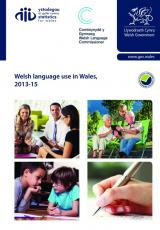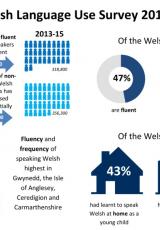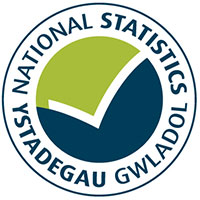Provides information about Welsh speaker’s use of the Welsh language for 2013 to 2015.
This is not the latest release in the series: Welsh language use survey
Respondents to the National Survey for Wales were asked to identify all members in their household who could speak Welsh. A self-completion Welsh language use questionnaire was subsequently left for each Welsh speaker between April 2013 and March 2015 to complete and return by post.
This survey enables comparisons to be made with the previous Welsh Language Use Surveys of 2004-06.
'Welsh language use in Wales, 2013-15' includes the full survey results for 2013-15 and updates the interim report 'National Survey for Wales, 2013-14: Welsh Language Use Survey' published on 29 January 2015.
Main points
- Both the number and percentage of fluent Welsh speakers are fairly similar to those in the Welsh Language Use Surveys of 2004-06 although 130,700 more people now say that they speak Welsh but not fluently.
- Almost half of all Welsh speakers consider themselves fluent Welsh speakers and 21% are able to speak a fair amount of Welsh. In 2004-06, 58% of Welsh speakers stated that they were fluent, and 21% stated that they spoke a fair amount of Welsh.
- The highest concentrations of fluent Welsh speakers are found in local authority areas in west Wales. However, some of the largest decreases in the number of fluent Welsh speakers since 2004-06 have been in these areas. In contrast, the largest increases in the number of fluent Welsh speakers during this period were seen in Cardiff and Rhondda Cynon Taf.
- Just over a half of Welsh speakers speak Welsh daily; almost one in five speak Welsh every week.
- Young Welsh speakers are more likely to have learnt to speak Welsh at school than anywhere else. Older Welsh speakers are more likely to have learnt Welsh at home as a young child than anywhere else.
- Young people are more likely than older people to have received their education only or mainly through the medium of Welsh.
- Young people are more likely to speak Welsh at school than with their friends or at home.
- Just over half of Welsh speakers try to use Welsh, at least occasionally, when dealing with public organisations.
Reports

Welsh language use in Wales, 2013 to 2015 , file type: PDF, file size: 7 MB

Infographic, 2013 to 2015 , file type: PDF, file size: 361 KB
Contact
Martin Parry
Email: welshlanguagedata@gov.wales
Rydym yn croesawu galwadau a gohebiaeth yn Gymraeg / We welcome calls and correspondence in Welsh.

